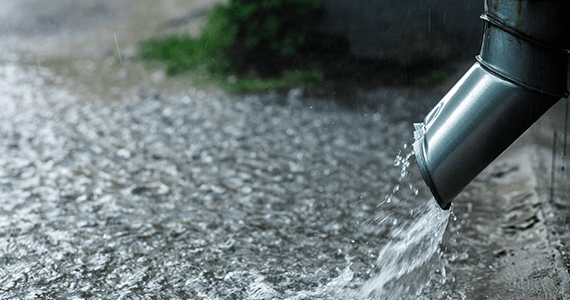Rain can be beautiful as it pitter-patters a rhythmic song on your roof. It can refresh as it washes away the dirt and dust that has accumulated on everything over the last few days and weeks. It brings life to plants and animals far and wide.
It is a foundation for life, yet it can bring with it unyielding destruction and relentless damage to roads and buildings and homes. We see it all over the news: flooding that wipes out roads, knocks out power, and washes away anything that’s not bolted down.
As a homeowner, you have the same love-hate relationship with rain. You love how it makes your lawn vibrant green and your flowers burst with blooms but the damage it can do to your roof, foundation, and landscaping can lead to some very expensive repairs.
Your Roof
Pounding rains can cause your shingles to curl or buckle, creating spots where the water can get in. If it makes its way to your ceilings, it can cause ugly staining. If left unrepaired, they can result in wood rot. During the winter months, the water freezes and expands, causing further damage.
Your Eaves
If ice accumulates around your eaves, ice dams form and the backed up ice pushes against your shingles and leaks into your home as it melts. They can be caused by clogged gutters, but usually, they’re caused by a combination of heavy snowfall, fluctuating outside temperatures, and heat loss through an improperly insulated roof.
Your Doors and Windows
If your doors and windows aren’t sealed properly, rain can seep in and cause wood rot and damage to walls and flooring, not to mention the heat loss during cold weather. If you don’t have gutters, pounding rain can splash up on the bottom of your doors, causing wood rot on the bottom of your door casing and frame.
Your Siding
Rain on your siding over time can cause staining and in areas where the sun doesn’t dry it out, mold can grow. If you have wood or shingle siding, heavy storms can cause water to get in and over time can cause wood rot.
Your Foundation
After prolonged rain, small cracks can appear in your foundation. Once the crack has formed and water gets in during winter months and freezes, the cracks get bigger, and then when those April Showers show up, you’ve got a flooded basement. Lots of rain can cause the soil around your foundation to swell and then shrink as it dries, which can cause severe damage to your home as it settles or sinks, causing cracks in walls, doors or windows that are difficult to open, chimney lean, or cracks in your basement floor.
Your Landscape
Too much water in your landscape can cause puddling on your lawn, it can kill your plants, and it can cause soil erosion which can cause root damage will make it difficult for plants to grow in the future. Areas of prolonged wetness are breeding grounds for pests.
What You Can Do
Fortunately, there are some steps you can take to minimize the damage that rain can do to your home.
Inspect your roof. Make sure that your shingles and eaves are in good shape and that it has adequate insulation to mitigate the formation of ice dams.
Seal your doors and windows. If you have a new home, you should probably reseal them within the first year when your house has had a chance to settle. After that, it should be done every 5 years or so to keep the water out and the heat in. If you have doors or windows that are already damaged, have them replaced. The damage will only get worse the more it rains.
Clean your siding. A power washer will eliminate and mold that might grow on your siding.
Repair cracks in your foundation. If you see cracks, have them filled and sealed so they don’t grow bigger.
Check your downspouts. They need to be installed so that water is directed far enough away from your foundation to cause damage.
Make sure the area around your foundation is graded away from the house. A French drain around it could be helpful as well.
Check your landscape’s drainage. You may have to regrade areas where water builds up or put in French drains.
Mulch. Spreading mulch around plantings can help prevent soil erosion.
Check your gutters. Not properly maintaining your gutters is a surefire way to cause damage to your home. Clogged gutters lead to water simply washing over them and pounding onto the ground below. It damages your siding, windows, doors, roof, foundation, landscape, and even the gutters themselves. If you don’t have gutters, having them installed is an investment that will pay off in damage prevention to your home.
At GutterPros, we know that the best defense against destructive rain is properly installed and maintained gutters. We can help you find just the right gutters that will protect and compliment your home’s exterior. Call us today at (314)656-7195 and find out how we can help you fight damaging rains.
Bring it on, Mother Nature!

